You are not alone if you have ever woken up to a nasty surprise from your furry friend on your bed. Many dog owners have experienced this unpleasant situation at least once in their lives.
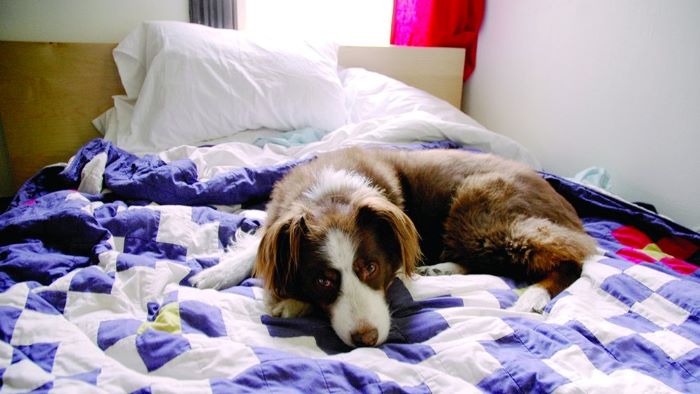
Why did my dog poop in my bed? And How can you ensure that it never occurs again? In this article, We’ll look at some of the potential reasons why dogs may poop in beds as well as effective solutions.
We’ll also offer some tips and suggestions on how to stop this behavior from happening again and how to keep a positive, healthy relationship with your dog.
By the end of this article, You’ll comprehend the situation more clearly and know what to do if your dog poop on your bed.
Contents
Why Does My Dog Poop in My Bed?
Pooping on the bed is not a normal or acceptable behavior for dogs, and it can indicate a problem that needs to be addressed.
In this section, we will explain the common reasons why dogs poop in their owners’ beds, and what you can do to prevent and deal with this situation.
“Don’t let your dog’s pooping problem ruin your bed and your bond. Find out why it happens and how to fix it.”
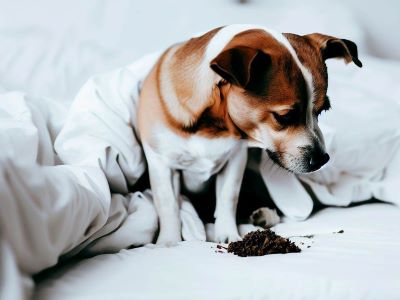
Health Issues
One of the potential causes of your dog dropping poop in your bed is a medical condition that interferes with bowel function.
Fecal incontinence, which occurs when your dog can’t control his or her bowel movements, can be brought on by certain medical disorders.[1]
Some of the common medical conditions that can cause fecal incontinence in dogs are:
a). Diarrhea: They are characterized by loose or watery stools, and they can be brought on by a variety of things, including dietary changes, parasites, infections, and inflammatory bowel disease (IBD).
In extreme circumstances, dogs experiencing diarrhea may lose control of their bowels.
b). Constipation: This is the opposite of diarrhea and occurs when your dog has difficulty passing stools or passes hard and dry stools.
Constipation can be caused by dehydration, lack of fiber, medication side effects, or obstruction in the colon.
Constipation can also lead to loss of bowel control in dogs, especially if they strain too hard or have impacted feces.

c). Parasites: These are organisms that live inside or on your dog and feed on his or her blood or nutrients.
Some common parasites that can affect your dog’s bowel function are roundworms, hookworms, whipworms, tapeworms, and giardia. Parasites can cause diarrhea, weight loss, anemia, and loss of bowel control in dogs.
d). Infections: They are brought on by microorganisms like bacteria, viruses, fungus, or protozoa that enter your dog’s body and inflict tissue damage or inflammation.
Salmonella, Campylobacter, Clostridium, Coronavirus, Parvovirus, and Distemper are a few frequent illnesses that might impair your dog’s bowel movements.
Fever, vomiting, diarrhea, dehydration, and bowel control issues can all be brought on by infections in dogs.
e). Old age: As your dog ages, his or her body undergoes various changes that can affect the bowel function.
For example, your dog may have reduced muscle tone in the rectum or anal sphincter, which can impair his or her ability to hold feces.
Your dog may also have nerve damage, spinal cord disease, or neural disorder that affects the sphincter’s function. Old age can also increase the risk of other diseases that can cause fecal incontinence in dogs.
Some of the signs and symptoms that may indicate that your dog has a health issue that causes fecal incontinence are:
- Scooting on the floor – may indicate a condition involving the anal sacs/glands
- Defecating in atypical areas (i.e., inside the home)
- Bloated abdomen
- Tenderness or aversion to being touched near the tail
- Loss of tone and voluntary movement of the tail
- Diarrhea or constipation
- Blood or mucus in the stool
- Weight loss
- Vomiting
- Fever
Behavioral Problems
Another possible reason why your dog may poop in your bed is that he or she has a behavioral problem that affects his or her potty habits. Some dogs may poop in their owners’ beds due to stress, anxiety, fear, boredom or separation issues.
These emotions can make your dog feel insecure, nervous, or restless, and may lead them to seek comfort or relief by pooping on your bed.
Some of the common emotional triggers that can cause your dog to poop in your bed are:[2]
a). Stress: Moving to a new home, having visitors over, getting a new pet, or having a baby can all result in changes in the environment, habit, or household that contribute to this.
Stress may impair your dog’s bowel function and make them feel overwhelmed, worried, or irritated.
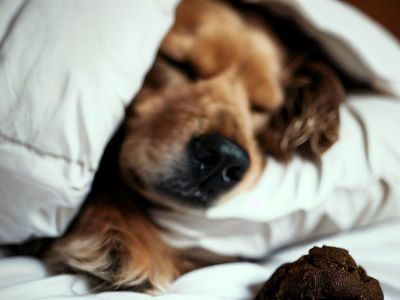
b). Anxiety: This can be caused by separation from you, fear of loud noises, unfamiliar people or animals, or past trauma. Anxiety can make your dog feel insecure, scared, or nervous, and may cause them to lose control of their bowel movements.
c). Fear: This can be caused by specific phobias, such as thunderstorms, fireworks, vacuum cleaners, or strangers. Fear can make your dog feel threatened, panicked, or startled, and may trigger a flight-or-fight response that involves pooping on your bed.
d). Boredom: This can be caused by lack of stimulation, exercise, or attention from you. Boredom can make your dog feel restless, frustrated, or lonely, and may lead them to seek attention or entertainment by pooping on your bed.
e). Separation issues: This can be caused by being left alone for long periods of time or having a strong attachment to you. Separation issues can make your dog feel anxious, depressed, or abandoned, and may cause them to express their distress by pooping on your bed.
Environmental Factors
Your dog might be impacted by environmental elements that alter his or her toilet habits, which is a third reason why your dog might defecate in your bed.
Some dogs may poop on their owners’ beds for a variety of reasons, including poor cleanliness, difficulty accessing designated areas, or uncertainty about where to go.
a). Poor hygiene: Some dogs may poop in their beds because they are not clean enough. This can happen if the dog’s bed or sleeping area is dirty, smelly, or infested with fleas or parasites.
The dog may try to cover up the unpleasant odor or sensation by pooping on top of it.
Alternatively, the dog may associate the bed with pooping if he or she has had previous accidents there and the bed was not properly cleaned or replaced.
b). Lack of access: Since they lack access to a suitable poop location, some dogs may urinate on their beds.
This may occur if the dog is kept indoors for an excessive amount of time, if it is too hot or cold outside, or if it is scared to go outside.
The dog could hold onto the waste until he or she is unable to anymore, at which point they will defecate wherever is closest to them, which just so happens to be your bed.
c). Confusion: Due to their confusion about where to go, some dogs may defecate on their beds.
If the dog is not adequately housebroken, if it has moved to a new residence, or if his or her habit has changed, these things may occur.
The dog might not be house-trained or may not remember the location of the designated bathroom. The dog could even defecate on your bed to declare his or her territory or assert dominance.
How to Clean Up Dog Poop in Bed?
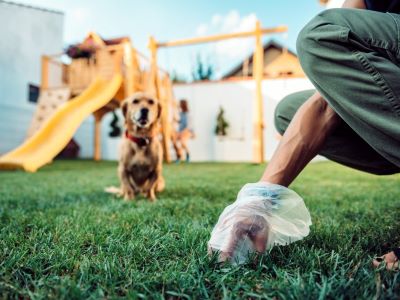
If your dog poops on your bed, you need to act quickly and effectively to remove the mess and the odor. Here are the steps you should follow to clean up dog poop in bed:
- Remove the poop and bedding as soon as possible: This step involves getting rid of the poop and the soiled bedding with gloves and a plastic bag, and scraping or blotting the poop off the bed.
- Use an enzyme-based cleaner to eliminate odors and stains: This step involves applying an enzyme-based cleaner to the area where the poop was and scrubbing it gently to remove any residue, and avoiding cleaners that can damage the mattress or worsen the odor.
- Wash the bedding in hot water and detergent: This step involves washing the bedding separately in hot water and detergent, and adding baking soda or vinegar to deodorize them, and checking the care labels before washing them.
- Dry the bedding thoroughly before putting it back on the bed: This step involves drying the bedding in a dryer or outside in sunlight, and making sure they are completely dry before using them again, and fluffing them up to restore their shape and softness.
Tips to Prevent Your Dog’s Pooping Problem
If your dog is pooping on your bed, you should take some steps to address the problem. Some of these are:
Consult a Veterinarian
The first thing you should do is rule out any medical issues that may be causing your dog’s pooping problem.
A veterinarian can perform a physical exam and run some tests to diagnose the underlying cause of your dog’s pooping problem.
Depending on the diagnosis, your veterinarian may prescribe medication, surgery, dietary changes, or other treatments to address the problem.
Train Your Dog
The next step is to teach your dog to relieve himself or herself only in a designated location and to receive praise for it.[3]
Also, you should refrain from penalizing your dog when he or she has a mishap because doing so could simply exacerbate their confusion or anxiety.
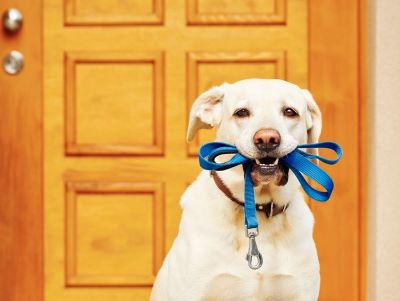
Instead, politely tidy up the mess and guide your dog to the proper location. Your dog should also have a regular eating and elimination schedule, and you should make sure that he or she always has access to an outdoor toilet place.
Provide a Clean and Comfortable Sleeping Area
Giving your dog a tidy and comfy resting space should be your very last priority. The bedding for your dog has to be washed and changed on a regular basis, and you should look for any indications of parasites, illnesses, or fleas.
Moreover, you want to take out any items from your dog’s bed that might provide unpleasant odors or sensations, including food crumbs, stains from urine, or chewed-up toys.
While this may confuse your dog, make sure that his or her bed is not situated too close to where he or she does pee.
FAQs
Why has my dog started pooping the bed?
Dogs may start pooping in the bed due to medical issues, stress, anxiety, or changes in routine. Consulting a veterinarian and maintaining a consistent potty training routine are crucial for addressing this behavior.
Why did my dog pee and poop on my bed?
Dogs may pee and poop on the bed due to inadequate potty training, disruptions in routine, medical conditions, stress, anxiety, or marking territory. Consulting a veterinarian can help determine the cause and develop a behavior modification plan.
Should I punish my dog for peeing in my bed?
Punishing a dog for peeing in the bed is not advised, as it can create fear and anxiety. Instead, use positive reinforcement and seek guidance from a professional trainer or behaviorist to address the issue effectively.
Conclusion
In conclusion of Why did my dog poop in my bed, Understanding this behavior of your dog is crucial for effective resolution of this issue.
By identifying the underlying causes, such as medical conditions, stress, or lack of training, owners can take appropriate steps to address the problem. Punishment is not recommended, as it can exacerbate the issue and harm the dog’s well-being.
Instead, focusing on positive reinforcement and consistent training methods can yield better results. However, if the problem persists or worsens, seeking professional help from a veterinarian or a dog trainer is highly encouraged.
Remember, a supportive and understanding approach will not only help resolve the issue but also strengthen the bond between you and your furry companion.
References:
- PetMD Editorial. (2022a). Lack of Bowel Control in Dogs. – PetMD
- Grigg, E. K., Chou, J., Parker, E. J., Gatesy-Davis, A., Clarkson, S. T., & Hart, L. A. (2021). Stress-Related Behaviors in Companion Dogs Exposed to Common Household Noises, and Owners’ Interpretations of Their Dogs’ Behaviors. Frontiers in Veterinary Science, 8. – Frontiers
- House Training Your Dog. (n.d.). Retrieved July 3, 2023, from – Brown University

When it comes to dogs, Julia ignores nothing. Being an animal behaviorist, dog trainer and a dog parent she knows exactly how even a tiny change in a dog’s surroundings and diet can leave dogs disturbed for a longer duration. Hence, she always makes sure to review for us only the best products for dogs out there.


